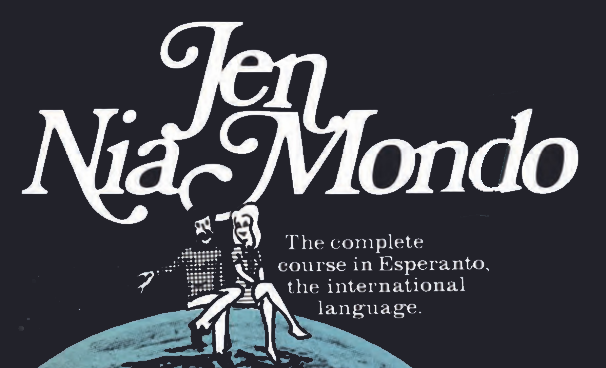
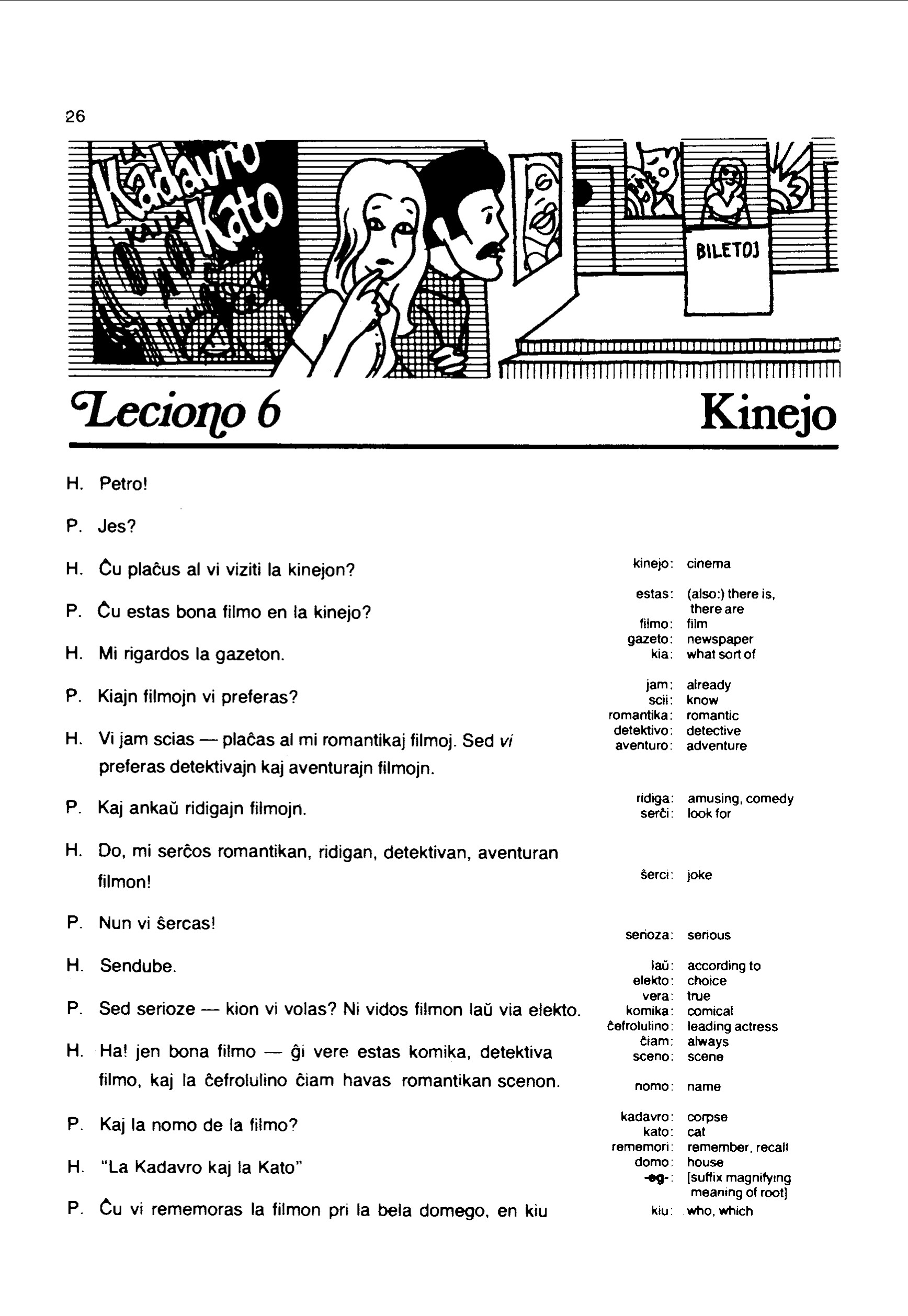
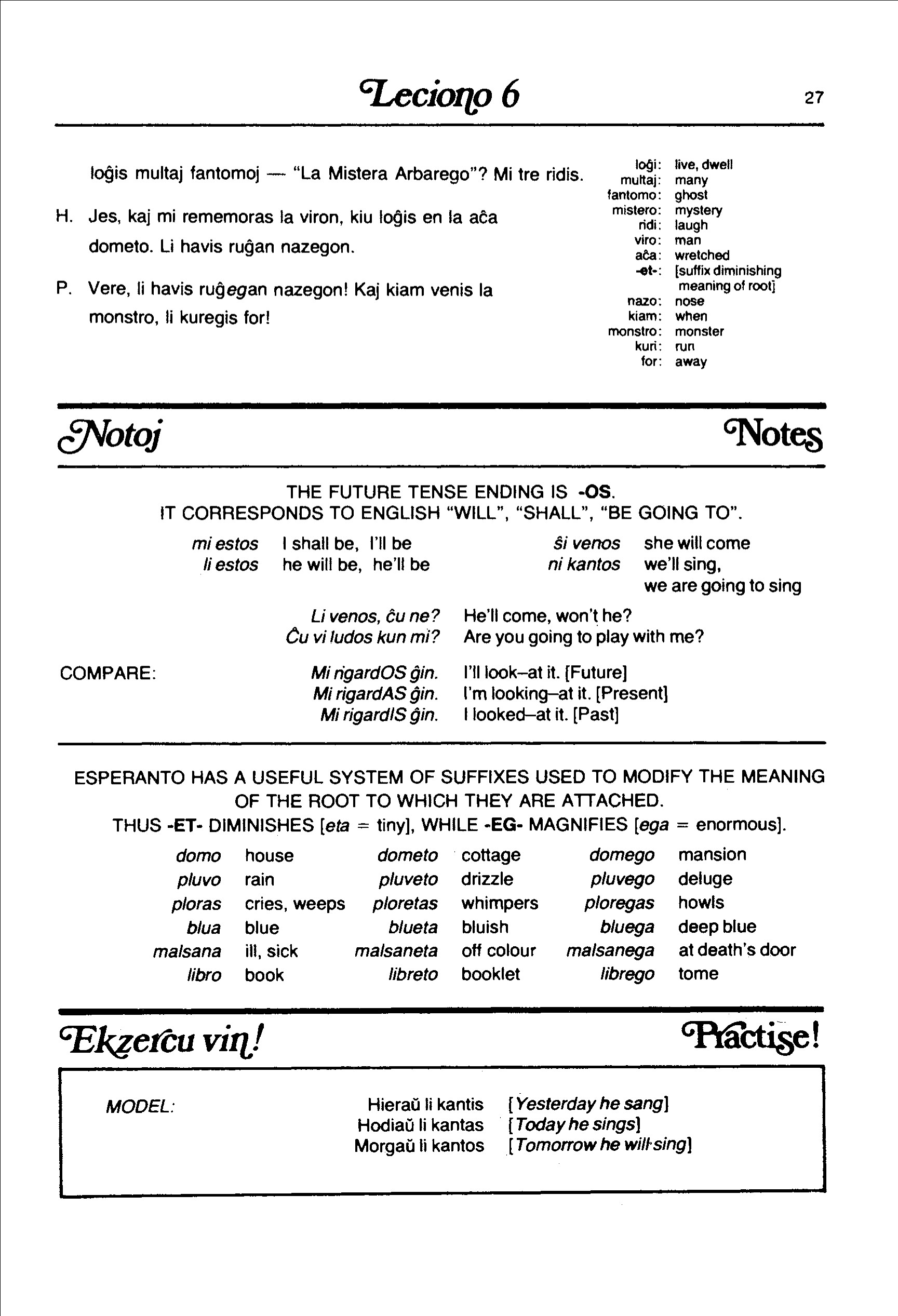
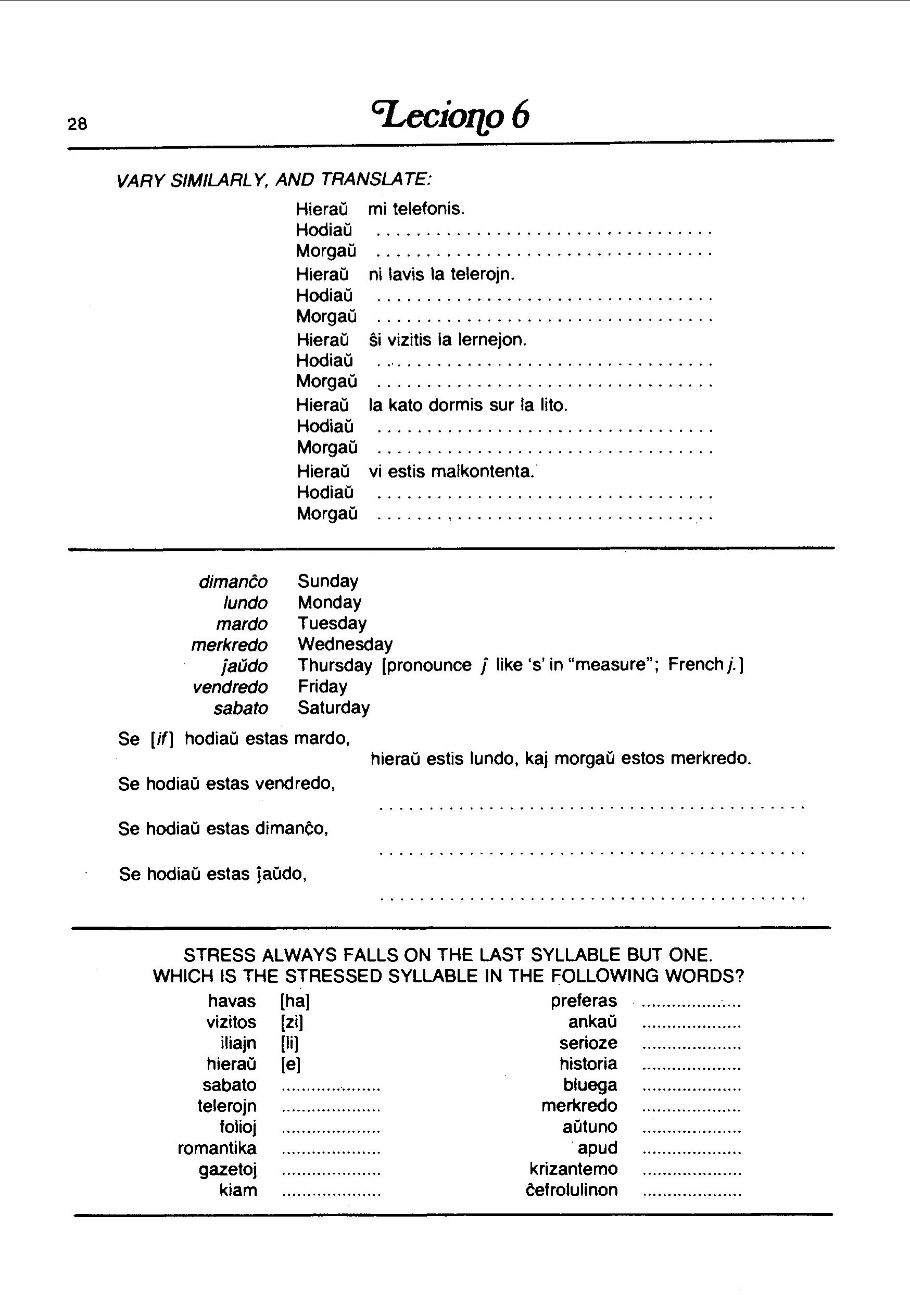
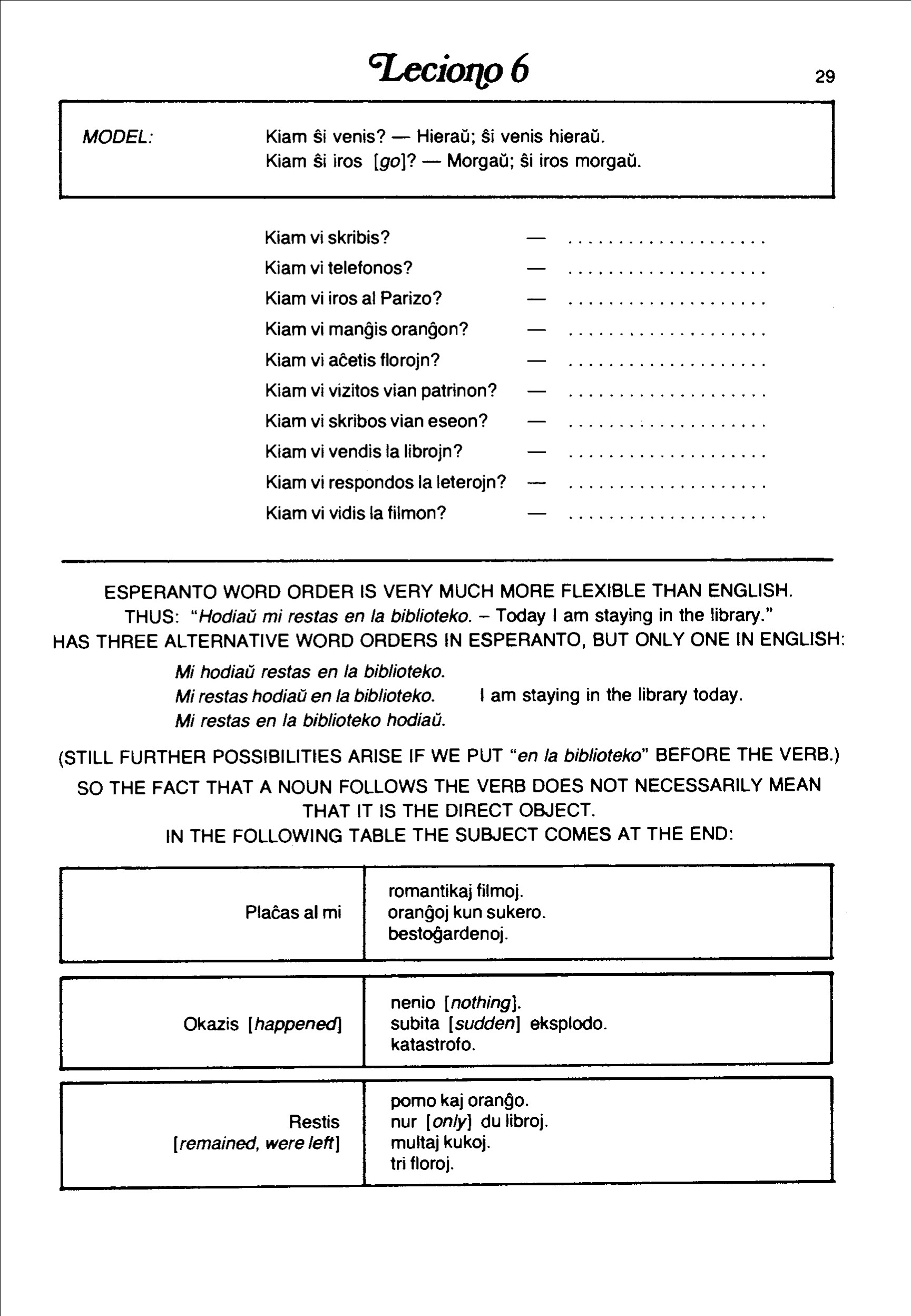
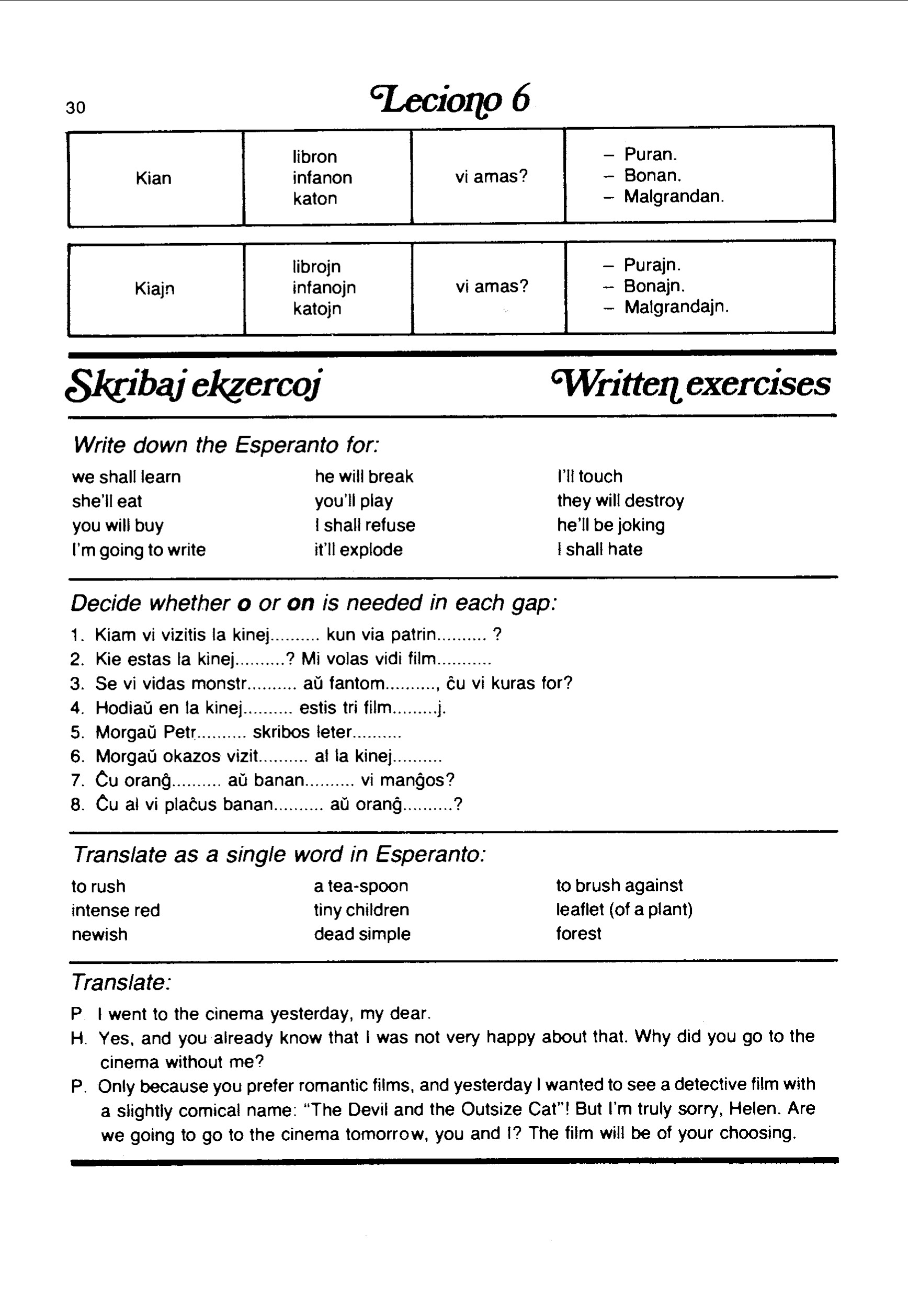
Dialogue
Did you enjoy the discussion about suffixes (also called by the wider term ‘affixes’). The presenter used quite a number of technical words – did you make a note of them? Don’t worry. They are an essential part of how Esperanto makes words and cuts down on having to learn too many totally new ones. You will be meeting them more formally in later lessons. Don’t try to learn them all now!
Here is an alphabetic list of the ones mentioned on the sound track:
AĈ pejorative – aĉa means wretched, horrible; domaĉo – a hovel
AĴ a concrete form of – aĵo means a thing (in an open general sense); belaĵo – a beauty
AD continuing action, duration – kurado means running (the activity)
AR collective – arbaro means wood i.e. a collection of trees
EG augmentative – ega means huge, very big; domego – mansion
ET diminutive – eta means ‘tiny‘, ‘very small’; dometo – cottage
IG causative – fali means to fall; faligi means make fall, to fell
IN female form of – hundino means a bitch; katino means a female cat
IST means a regular doer of, professional; bibliotekisto means a librarian
UL an individual characterised by – romantikulo means a romantic person

Answers are offered below
As with previous lessons the answers are not definitive.
Please attempt the exercises above before consulting the material below
Example Answers / Ekzemplaj Solvoj
Ekzercu vin!
paĝo 27/28
Hieraŭ mi telefonis. Hodiaŭ mi telefonas. Morgaŭ mi telefonos.
Hieraŭ ni lavis la telerojn. Hodiaŭ ni lavas la telerojn. Morgaŭ ni lavos la telerojn.
Hieraŭ ŝi vizitis la lernejon. Hodiaŭ ŝi vizitas la lernejon. Morgaŭ ŝi vizitos la lernejon.
Hieraŭ la kato dormis sur la lito. Hodiaŭ la kato dormas sur la lito. Morgaŭ la kato dormos sur la lito.
Hieraŭ vi estis malkontenta. Hodiaŭ vi estas malkontenta. Morgaŭ vi estos malkontenta.
dimanĉo lundo mardo merkredo ĵaŭdo vendredo sabato (no capitals needed)
Se [if] hodiaŭ estas mardo, hieraŭ estis lundo, kaj morgaŭ estos merkredo.
Se hodiaŭ estas vendredo, hieraŭ estis ĵaŭdo, kaj morgaŭ estos sabato.
Se hodiaŭ estas ĵaŭdo, hieraŭ estis merkredo, kaj morgaŭ estos vendredo.
havas [ha] vizitos [zi] iliajn [li] hieraŭ [e] sabato [ba] telerojn [le] folioj [li] romantika [ti] gazetoj {ze] kiam [ki] preferas [fe] ankaŭ [an] serioze [o] historia [ri] bluega [e] merkredo [kre] aŭtuno [tu] apud [a] krizantemo [te] ĉefrolulinon [li]
paĝo 29
Kiam vi *skribis? Hieraŭ; mi skribis hieraŭ.
Kiam vi telefonos? Morgaŭ; mi telefonos morgaŭ.
Kiam vi iros al Parizo? Morgaŭ; mi iros al Parizo morgaŭ.
Kiam vi manĝis oranĝon? Hieraŭ; mi manĝis oranĝon hieraŭ
Kiam vi aĉetis florojn? Hieraŭ; mi aĉetis florojn hieraŭ
- ‘skribi’ is the general word for ‘write’. There is separate term for what English calls ‘to write creatively’, compose (in this sense) – verki. e.g. mi verkis poemon (poem).
Kiam vi vizitos vian patrinon? Morgaŭ; mi vizitos mian patrinon morgaŭ.
Kiam vi skribos vian eseon? Morgaŭ; mi skribos main eseon morgaŭ.
Kiam vi vendis la librojn? Hieraŭ; mi vendis la librojn hieraŭ.
Kiam vi respondos la leterojn? Morgaŭ mi respondos la leterojn.
Kiam vi *vidis la filmon? Hieraŭ mi vidis la filmon.
- ‘vidi‘ is the general word for ‘see‘. There is a separate term for what English calls’spectate’ or ‘watch’ – ‘spekti’ e.g. mi spektis futballudon. (football game).
The remark here about the possible places for ‘today’ seems a bit strange today! While ‘today’ often is left until last, it could be in other places, especially in first place! Again putting the verbs ‘plaĉas‘, ‘okazis‘ and ‘restis‘ first as sĥown is only one option. It is however a forceful and elegant option, not often available in English. Occasionally English can achieve the same effect using the empty word ‘there‘ as first word. So ‘Restis pomo kaj oranĝo‘ could be expressed ‘There remained an apple and a pear’
paĝo 30
Kian libron vi amas? Bonan – What kind of book do you love? A good one.
Kian infanon vi amas? Puran – What kind of child do you love? A clean one.
Kian katojn vi amas? Malgrandajn. – What kind of children do you love? Small ones.
Skribaj ekzercoj
ni lernos li rompos Mi tuŝos ŝi manĝos vi pudos ili detruos vi aĉetos mi rifuzos li ŝercos mi skribos ĝi ekspodos mi malamos
1. Kiam vi vizitis la kinejon kun via patrino?
2. Kie estas la kinejo? Mi volas vidi filmon.
3. Se vi vidas monstron aŭ fantomon, ĉu vi kuras for?
4. Hodiaŭ en la kinejo estis tri filmoj.
5. Morgaŭ Petro skribos leteron.
6. Morgaŭ okazos vizito al la kinejo.
7. Ĉu oranĝon aŭ bananon vi manĝos?
8. Ĉu al vi plaĉus banano aŭ oranĝo?
Traduku!
rush – kuregi te-kulero kontraŭbrosi ruĝega tiny children – infanetoj leaflet – folieto newish – noveta
dead simple – simplega forest – arbarego
P. Mi iris al la kinejo hieraŭ, mia kara.
H. Jes, kaj vi jam scias, ke mi ne estis tre feliĉa pri tio. Kial vi iris sen mi?
P. Nur ĉar vi preferas romantikajn filmojn kaj hieraŭ mi deziris vidi [spekti] detektivan filmon kun la iom komika nomo [titolo] “La Diablo kaj la Katego”! Sed mi vere bedaŭras, Helena. Ĉu ni iros al la kinejo morgaŭ, vi kaj mi? La filmo estos laŭ via elekto.
Lesson 6 Words worth learning
Aĉ/a
Aventur/o
Bibliotek/o
Ĉef/o
Ĉiam
Detektiv/o
Dom/o
Ega
Elekt/o
Eta
Fantom/o
Film/o
For
Hieraŭ
Hodiaŭ
Jam
Jaŭd/o
Kadavr/o
Kiam
Kinej/o
Komik/a
Kur/i
Li/a
Loĝ/i
Lund/o
Wretched
Adventure
Library
Chief
Always
Detective
House cf domicile
Enormous
Choice cf elect
Tiny
Ghost cf fantom
Film
Away
Yesterday
Today
Already
Thursday
Corpse cf cadaver
When
Cinema house
Comical
Run
His
Live, dwell cf lodge
Monday
Mard/o
Memserv/a
Merkred/o
Mister/o
Monstr/o
Morgaŭ
Mult/aj
Naz/o
Nenio
Ni/a
Nur
Okaz/i
Pluv/o
Rest/i
Ridig/a
Sabat/o
San/a
Scen/o
Sci/i
Se
Serĉ/i
Serioz/a
Subit/a
Vendred/o
Tuesday cf mardi gras
Self-service
Wednesday
Mystery
Monster
Tomorrow
Many
Nose cf nasal
Nothing
Our, ours
Only
Happen cf occasion
Rain cf pluvial
Remain, stay
Funny
Saturday cf sabbath
Healthy, well
Scene
Know cf science
If
Look for cf search
Serious
Sudden
Friday
- Tab #1
- Tab #2